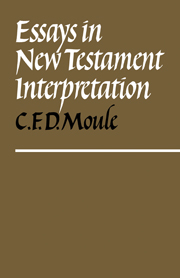Book contents
- Frontmatter
- Contents
- Foreword
- Acknowledgements
- Abbreviations
- Jesus in early Christian interpretation
- 1 Fulfilment-words in the New Testament: use and abuse
- 2 Jesus in New Testament kerygma
- 3 The use of parables and sayings as illustrative material in early Christian catechesis
- 4 The Ascension – Acts i.9
- Studies in the Gospels
- Two studies in the Epistles
- Two linguistic studies
- Studies exegetical, doctrinal and ethical
- Index
3 - The use of parables and sayings as illustrative material in early Christian catechesis
Published online by Cambridge University Press: 05 November 2011
- Frontmatter
- Contents
- Foreword
- Acknowledgements
- Abbreviations
- Jesus in early Christian interpretation
- 1 Fulfilment-words in the New Testament: use and abuse
- 2 Jesus in New Testament kerygma
- 3 The use of parables and sayings as illustrative material in early Christian catechesis
- 4 The Ascension – Acts i.9
- Studies in the Gospels
- Two studies in the Epistles
- Two linguistic studies
- Studies exegetical, doctrinal and ethical
- Index
Summary
Archbishop Carrington, Dr Selwyn, and others have made us familiar with the idea of a more or less definable body of teaching for catechumens underlying the New Testament writings; but less attention seems to have been given to the possibility that a body of illustrative material consisting of parables, allegories, and familiar authoritative sayings may also have been current for use in the same connexion, although this is indeed implied by the belief entertained by many scholars that some of the material of this sort in the gospels is to be traced to early catechists and preachers rather than to the Lord himself.
This note, an attempt to ask some questions in relation to this matter, was suggested by the fact that the Lucan story of Martha and Mary (Lk. x. 38–42) provides a curiously apt pictorial illustration of the attitude alluded to by St Paul in I Cor. vii. 35, and is also strikingly close to that verse in vocabulary. St Paul says that his object in urging the single estate is not to cast a snare upon them (is this curious metaphor itself an allusion to some image now lost to us?), but πρὸς τὸ εὔσχημον καὶ εủπάρεδρον τῳ Κυρίῳ ἀπερισπάστως, ‘with a view to their behaving in a decorous way, duly seated by the Lord without distraction’.
Information
- Type
- Chapter
- Information
- Essays in New Testament Interpretation , pp. 50 - 53Publisher: Cambridge University PressPrint publication year: 1982
